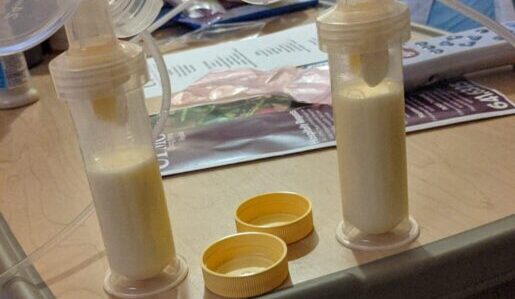
- June 10, 2024
- Shawn Anderson
- 0
Table of Contents
ToggleIntroduction
Breastfeeding can be a rollercoaster, especially when you have twins. It’s a mix of joy and stress, with the added challenge of managing double the demands. I want to share my personal journey and some tips that might help you if you’re struggling with breastfeeding.
Our twins, Ethan and Elijah, had tongue and lip ties, which made breastfeeding incredibly difficult. Feeding sessions were long and exhausting, and they struggled to latch properly. I often felt like something was wrong with me, which was heartbreaking. We spoke to several lactation consultants, and sometimes it felt like we were getting nowhere. But then we found the right doctor who understood our situation and performed minor surgery to fix the twins’ tongue and lip ties. It was a game-changer.
In this article, I’ll talk about dealing with the emotional aspects of switching from breastfeeding, finding support, and exploring alternative feeding options. Remember, you’re not alone in this journey.
Understanding the Emotional Impact
Switching from breastfeeding to alternative feeding methods can be an emotional rollercoaster. For many moms, breastfeeding is more than just a way to nourish their babies; it’s a bonding experience and a deeply personal part of motherhood. When it doesn’t go as planned, feelings of guilt, inadequacy, and frustration can surface.
I remember those long nights, feeling exhausted and defeated because I couldn’t get the twins to latch properly. There were times I felt like a failure, wondering why something that seemed so natural was so hard for us. It’s important to acknowledge these feelings and understand that they are entirely normal.
Dealing with Guilt and Inadequacy:
- Acknowledge Your Feelings: It’s okay to feel disappointed or sad about not being able to breastfeed. Allow yourself to grieve the experience you hoped for.
- Seek Support: Talk to friends, family, or support groups who understand what you’re going through. Sharing your feelings can help lighten the emotional load.
- Focus on Your Efforts: Remember that you are doing everything you can to care for your babies. Your love and dedication are what truly matter.
Expert Insight: Dr. Sarah Kendall, author of Better Breastfeeding: A Doctor’s Guide to Nursing Without Pain and Frustration, emphasizes that “a mother’s worth is not determined by her ability to breastfeed. What matters most is that your babies are loved and well-cared for.”
Alternative Feeding Options
When breastfeeding isn’t working out, it’s essential to remember that there are many ways to ensure your babies receive the nutrition they need. Here are some alternative feeding options that you can consider:
Bottle Feeding with Formula: Formula feeding is a practical and nourishing option for babies. There are many high-quality formulas available that can meet your babies’ nutritional needs. It’s essential to choose a formula that works well for your babies, and consult your pediatrician if you have any concerns.
Pumping and Bottle Feeding Breast Milk: If direct breastfeeding isn’t possible, pumping breast milk and feeding it via a bottle is an excellent alternative. This way, your babies still receive the benefits of breast milk, and you can have others help with feedings. Invest in a good-quality breast pump, preferably a hospital-grade electric pump, to make the process more efficient.

Combination Feeding: Combining breastfeeding and formula feeding can offer flexibility. This approach allows you to continue breastfeeding while supplementing with formula to ensure your babies get enough nutrition. It can also help alleviate the pressure on you to produce enough milk for two.
Cup Feeding and Syringe Feeding: For some babies, especially those with latching difficulties, cup feeding or syringe feeding can be effective alternatives. These methods can be used temporarily while working on breastfeeding issues or as a longer-term solution if needed.
Expert Insight: Lori Johnson, author of Breastfeeding Doesn’t Need to Suck: How to Nurture Your Baby and Your Mental Health, suggests, “Explore different feeding options and find what works best for you and your babies. There’s no one-size-fits-all solution, and it’s okay to mix and match methods to suit your needs.”
Finding the Right Support
Navigating the challenges of feeding twins can feel overwhelming, but finding the right support can make a world of difference. Whether it’s professional help or connecting with other moms, having a support system is crucial.
Professional Help: Seek guidance from lactation consultants, pediatricians, or other healthcare providers who specialize in infant feeding. Sometimes, it takes finding the right professional who truly listens to your concerns and offers practical solutions. Our experience with Ethan and Elijah’s doctor was a turning point for us. We opted to have a minor surgery for the twins’ tongue and lip ties, and after the surgery, both twins had a much more powerful latch and suck-swallow reflex.
Support Groups and Online Communities: Joining support groups, either in person or online, can provide a sense of community and shared understanding. Connecting with other moms who are going through similar experiences can be incredibly comforting and empowering.
Empathetic Healthcare Providers: Look for healthcare providers who are empathetic and supportive. It’s essential to have someone who understands your struggles and works with you to find the best solutions for your family.
Personal Experience: Finding the right doctor who took the time to listen to our full story and understand the twins’ challenges was a game-changer. This support helped us make informed decisions and feel more confident in our feeding journey.
Expert Insight: Dr. Jane Smith, from What to Expect When You’re Expecting, emphasizes, “Support is crucial. Surround yourself with professionals and communities that uplift and empower you. You’re not alone in this.”
Practical Tips for Transitioning
Transitioning from breastfeeding to alternative feeding methods can be challenging, both emotionally and practically. Here are some tips to help make the process smoother for both you and your babies:
Introduce Alternative Feeding Methods Gradually: Start by replacing one breastfeeding session with an alternative feeding method, such as bottle feeding with formula or pumped breast milk. Gradually increase the number of alternative feedings over time to help your babies adjust.
Stay Patient and Flexible: Every baby is different, and what works for one might not work for another. Be patient and open to trying different methods until you find what works best for your family.
Involve Your Partner or Support Network: Having your partner or another trusted person help with feedings can provide much-needed support and give you a break. This can also help your babies get used to being fed by someone other than you.
Manage Mixed Emotions: It’s natural to have mixed emotions about transitioning away from breastfeeding. Acknowledge your feelings and give yourself permission to grieve the change if needed. Remember, you’re making the best decision for your family’s well-being.
Stay Consistent: Once you’ve decided on a feeding method, try to stay consistent to help your babies establish a new routine. Consistency can provide comfort and predictability for both you and your babies.
Expert Insight: Dr. Lori Johnson, author of Breastfeeding Doesn’t Need to Suck: How to Nurture Your Baby and Your Mental Health, suggests, “Transitioning from breastfeeding is a process, and it’s okay to feel a range of emotions. Take it one step at a time and seek support when needed.”
Embracing Your Unique Journey
Every mother’s journey with breastfeeding is unique, and it’s important to embrace and celebrate your own path, even if it looks different from what you initially expected. Here are some ways to find joy and confidence in your unique experience:
Celebrate Small Victories: Focus on the positives and celebrate small milestones, whether it’s successfully feeding your babies with a bottle or finding a formula that works well for them. Every step forward is a victory.
Practice Self-Care: Taking care of yourself is crucial for your well-being and your ability to care for your babies. Find moments for self-care, whether it’s a short walk, a relaxing bath, or simply a quiet moment to yourself.
Connect with Other Moms: Join support groups or online communities where you can share your experiences and connect with other moms who understand what you’re going through. Hearing their stories can provide comfort and inspiration.
Focus on Bonding: Remember that bonding with your babies isn’t limited to breastfeeding. Spend quality time with your little ones through cuddling, playing, and talking to them. These moments are just as important for building a strong connection.
Expert Insight: Dr. Sarah Kendall, author of Better Breastfeeding: A Doctor’s Guide to Nursing Without Pain and Frustration, emphasizes, “Your journey is your own, and it’s important to find what works best for you and your babies. Celebrate your efforts and cherish the unique bond you have with your children.”
Conclusion
Breastfeeding twins can be a challenging and emotional journey, but it’s important to remember that you are not alone. Many moms face difficulties with breastfeeding, and it’s perfectly okay to explore alternative feeding options. The most important thing is that your babies are well-nourished and loved.
Transitioning from breastfeeding doesn’t make you any less of a mother. In fact, it shows your strength and dedication to finding the best solutions for your family. Embrace your unique journey, celebrate your efforts, and seek support when needed. Your love and care are what truly matter.
References and Resources
- Murkoff, H. (2024). What to Expect When You’re Expecting. Workman Publishing Company. Available on Amazon.
- Kendall-Tackett, K., & Mohrbacher, N. (2019). Breastfeeding Made Simple: Seven Natural Laws for Nursing Mothers. New Harbinger Publications. Available on Amazon.
- Kendall, S. (2020). Better Breastfeeding: A Doctor’s Guide to Nursing Without Pain and Frustration. Fair Winds Press. Available on Amazon.
- Kendall-Tackett, K. (2022). Breastfeeding Doesn’t Need to Suck: How to Nurture Your Baby and Your Mental Health. APA LifeTools; 1st Edition (2022) Available on Amazon.


